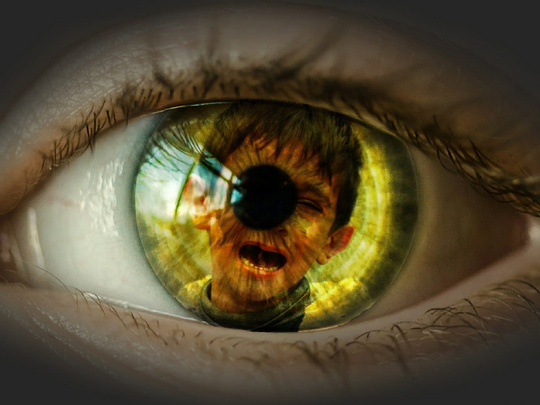
Someone fractured the spool of time. There is a definite before and after, but you are stuck in a vacuum, trying to connect the dots. A child dying, say parents, is against the law of nature – it’s a soul crushing, emotionally draining nightmare.
If it’s a sudden death, with no time to process a lead up to a moment, it may be worse, some argue. Others decry this, seeing a crumbling path you are to fall off is no comfort.
Either way, what’s left is a deep, dark abyss that you are desperately trying to maneuver out of. What’s left is survivor’s guilt, a sense of shame and helplessness.
In light of the spate of underage deaths this past month in the UAE, which, in some cases the law says is caused by adult negligence, we asked experts about how a parent can deal with the rush of grief, especially when you also have to contend with the system.
“Especially [when] some parents may be blamed for the death of their child due to negligence, the importance of a good support system cannot be stressed enough,” says Sneha John, Child & Adult Psychologist, LifeWorks Holistic Counselling Centre. “A good support system may consist of close family or friends who stand with the family, take time to offer practical support if required, offer help only when approached, listen fully without giving any advice and instill hope within the family to move on, just by being there for them.”
What is a banana peel-slide into a setback is an exhaustive analysis of the happening – and questioning every decision you’ve ever taken. “This would only create unnecessary confusion and turmoil within family members. Being careful with associations at the time of grief and prioritizing privacy and personal space would be vital,” explains Dr John.
Dark days
The stages of grief, explain doctors, are blankets of emotion that come in smothering waves – it’s easy to get overwhelmed and there’s a lot of overlap. The stages are: denial, anger, bargaining, depression and acceptance.
Dr John explains: “The first one would be denial and shock. Denial helps the person pace their feelings of grief. It is nature’s way of letting in specific information that one is able to process. As the person slowly accepts the reality of the loss and begins to ask questions, they are unknowingly beginning the healing journey. However, the process of asking questions can also turn negative. This often creates a tendency for self-blame even as one seeks the opinion of others to help shape answers. It would be helpful to process the questions individually, writing down each one.
“As this is done, one may be mindful that the answers to some of these questions may be based on assumptions and not facts. The next stage in the grief progress is anger, either towards self or others. Anger is usually the first thing we feel when we begin to release feelings related to the loss. Underneath this anger may be the pain and guilt of losing this loved one. As the person is willing to express their anger and acknowledge this feeling, the more they would begin to heal.
“One may also experience bargaining which is the third stage of grieving. It is common when coping with loss to feel so desperate that one is willing to do almost anything to alleviate or minimise the pain. Losing a child can cause parents to consider any way they can avoid the current pain or the pain anticipated from loss. This is a natural part of the grieving process. As parents take the time to process, they may acknowledge that, ‘this is a normal feeling and won’t last forever.’ The fourth stage would involve depression. There could be times within the process that they feel misunderstood, hopeless and helpless.
“A helpful way of processing this would be for parents to be mindful that they are still on the journey towards full recovery. Thinking and sharing fond memories of the loved one, reminiscing the virtues they carried in life and associating with bereaved parents who are on the similar journey may cause strength and encouragement to rise from within. Eventually, a level of acceptance is formed with them,” she adds.
Stick together
As a parent going through it, look at the other guardian(s), for their emotional upheaval is possibly the only thing that will come close to what you are feeling. “As parents who have lost their child, they need to be each other’s pillar of strength. Take care of your marital relationship by trying not to shut down from your partner. Instead, stick together as a family or couple and communicate with each other. Being with each other is better than grieving alone,” explains Esther Mathews, Clinical Psychologist at Openminds Psychiatry, Counseling and Neuroscience Center.
Say it out loud
When confronted by bone-numbing grief, often the natural thing to do is to withdraw, to try and “deal” with the pain in solitude. There are reverberations of “it’s not fair”, “why my child?” and the heartbreaking admission that you’d give anything to trade places with him/her. Don’t shut yourself off. It’s important to keep a journal, go to therapy and voice aloud how you are feeling. It helps you confront the facts – and so to eventually move on.
“[The] sudden loss of a child can bring immense shock to the parents. It is really important to put your emotions such as sadness, anger into words. Express yourself appropriately rather than withdrawing yourself from other people in your surroundings,” says Mathews.
Physical needs
When you are emotionally tired, it can seem like an impossible task, taking care of your own physical health – paying attention to food and exercise. “They [people grieving] may forget to eat, stop exercising, and rely on fast food because they just don't have the energy to cook. They also might neglect regular doctor visits and checkups,” explains Dr John. But this will only add to the mental strain. “Parents need to understand that not taking care of themselves won’t decrease their sadness, instead it could create additional physical problems,” says Dr Mathews.
Ask for help
“Every individual grieves differently. Try to get professional help from a counsellor or a clinical psychologist who is specialised in grief and bereavement issues. If you can’t afford individual therapy join support groups exclusively for Grief. Professional support helps any unforeseen issues and also helps parents to cope with the different stages of grief,” she adds.
Take your time to heal
It’s not like you will suddenly feel whole again, but you will learn how to live with the loss. “As parents cope with the loss of their child, the grief journey may not end in a week, a month or even a year. Hence, the expectations of others’ may be not an accurate guideline for progress. It is important to be patient with yourself and with your family members. It also helps to be tolerant and accepting of the different approaches others may take on their own grief journey,” says Dr John.
The thing about law…
“Law takes its own course. If law, proves that parents are guilty then there will be legal proceedings. However, it is not respectful to judge or pass demeaning statements about parents. They know how their life has suddenly changed due to the loss of their child, legal formalities, and expectation from other family members,” says Dr Mathews.
While grappling with the turmoil that comes with loss and the darkness that comes with being blamed for the loss – even if only while investigations are on – it’s important to avoid negative people.
And just as necessary is the effort to stay in touch with family. “The time of grief within a family may create hostility and isolation among family members. Hence, family members can ensure that they communicate with each other regularly, check on each person’s progress and rely on another during this time. Sometimes it may be uncomfortable for family members to share their feelings amongst themselves. However, doing this while continuing to get professional help would be healthy. For some families, faith helps in uniting them together and looking forward with hope,” says Dr John.
For now, time may have stilled, but remember always – this too shall pass.








